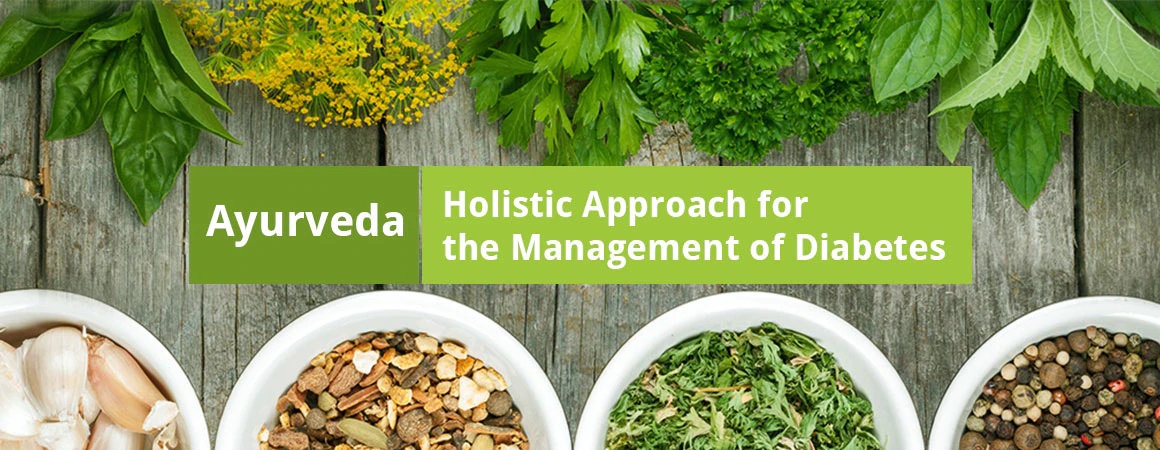
Understanding Diabetes in the light of Ayurveda
Diabetes:
As per modern science Diabetes a chronic illness characterized by persistent increased sugar levels in blood caused by defects in insulin secretion, function of insulin or both. Genetically predisposed Type 1 and lifestyle acquired Type 2 are its variants. Generally, its signs and symptoms are increased thirst, frequent urination, extreme hunger, unexplained weight loss, fatigue, irritability, blurred vision, delayed healing of wounds and frequent infections. Early diagnosis of diabetes and prediabetes is essential using recommended Hemoglobin A1c criteria because over time, diabetes can damage the heart, blood vessels, eyes, kidneys, and nerves.
Types of Diabetes: Type I – Due to
- Beta Cell destruction usually leading to absolute insulin deficiency
- Impaired beta cell function due to genetic defect
- Impaired insulin action due to genetic defect
Types of Diabetes:Type 2 – Due to
- Insulin resistance
- Impaired insulin secretion
- Glucose intolerance and insulin resistance due to the advancement of age
- Other hormonal defects
- Drug induced
- Infections
Complications:
- Neuropathy (Numbness and burning sensation over plantar and palmar surfaces)
- Retinopathy
- Nephropathy (Renal tissue Damage)
- Boils and Carbuncles
- Gangrene
- Cardio Vascular Disease
- General Debility and Loss of Libido
Diabetes – Prameh – Ayurvedisc approach
Dia means Excess and Betes means Urination. Excess of Urination is called as Diabetes. When there is increased level of glucose in blood than normal then this increased blood glucose is excreted outside the body through urine for which there is increased frequency of urination. In Ayurveda, a disease named as Prameha is mentioned meaning of which is “Prabhuten Mehati iti prameha” which again means increased frequency of urination.
Ayurveda has mentioned 20 types of this Prameha. Out of which Madhumeh may mimic as Diabetes Mellitus where both the sciences say that the tastes of urine becomes Honeylike i.e. sweet. Out of 20 types of Prameha 10 are caused by the vitiation of Kaf dosh. Which are easy to cure. 6 types of Prameha are caused by the vitiation of Pitta dosh. They can be controlled but complete cure is difficult. It depends on the lifestyle of the patient. Rest 4 types are not curable they. Out of which 1 is madhumeh. But to diagnose Ayurvedic Prameha need ayurvedic type of diagnostic methods. Hyperglycemia condition is not actual Prameh or Madhumeh.
According to Ayurveda, the main culprit in the pathogenesis of Prameh is Kled. Which is a byproduct of hampered or disturbed digestion. Ayurvedic concept of digestion is much deeper than merely feeling hungry after last food. This kled which accumulates in body is usually excreted ouside the body through Urine (Mutra) Mutrasya Kleda vahanam…
Causes as per Ayurvedic classics
- Sedentary life style, Lack of exercise, sleeping in day time or staying awake at night,
- Eating curd without following the rules to eat curd according to Ayurveda,
- Drinking excess of water or drinking water stagnated at one place for longer duration,
- Eating milk and milk products in excess.
- All these factors leads to the indigestion at deeper levels which causes excess production of kled which accumulates in blood as glucose or in much excess quantity excreted out through urine.
- Excess usage of Guru (Heavy to digest), Snigdha (Oily), Amla (Sour or fermented) and Lavana (Salt) rasa
- Navanna (food prepared with newly harvested grains)
- One more causative factor of today’s era’s diabetes is Stress. Ayurveda has stated a relation between Agni (Digestion) and mind. When the mental state is disturbed due to multiple factors then digestion gets hampered causing excess kled.
Our Approach Towards Diabetes
All these conditions are treated by treating Agni, through regulations of Aahara (Diet), Vihara (Lifestyle) Oushada (Medicine) and Panchakarma Therapy (Detoxification).
The treatment provides metabolic correction and activation of the functions of internal organs thereby effectively managing the present disease symptoms as well as its further advancement, thus keeping the patient away from future complications of diabetes.
Prevention
- Follow Proper Dinacharya (Daily Regimen) and Ritucharya (Seasonal regimen)
- Regular exercises
- Regular use of Rasayana drugs (Amalaki, Hareetaki etc.)
- Use of various preparations made from Yava (Barley), Moong Dal(Green gram), Methi, Bitter gourd, Ash gourd, Cucumber etc. as per advice of Ayurvedic Vaidya.
- Avoid Sugar, Sugar products, Fried foods, Dairy products
- Avoid day sleep and laziness.
- Doing Detoxifiaction therapis at regular intervals.
Medical
- Use of Samanaushadha (Amalaki, Haridra, Methi, Meshasringi as per diagnosed condition.)
- Proper Panchakarma/ Shodhana Kriya (Vamana, Virechana, Basthi etc)
- Yoga, Pranayama and Meditation
Advise
- Do Physical activity 45-60 minutes daily preferably 12 Suryanamskar, Walking, Yogasana as per advice of Ayurvedic Vaidya.
- Increase use of Barley, Green gram, Methi, Horse gram etc in daily meal
- Restrict or stop intake of rice, potato, tapioca (Sabudana), milk, milk products, oily foods and sweets
- Avoid use of tobacco and liquor in any form.
- Meditation for 15-20min per day.
- Avoid Sleeping during daytimes and staying awake at night.
- Morning meals in between 10-11am and dinner before 8 pm.
- Take utmost care of personal hygiene especially hand and feet
- Check HBA1C, Renal function, Lipid profile and examine Eye, Foot & Cardiac functions once in 6 months or in 1 year